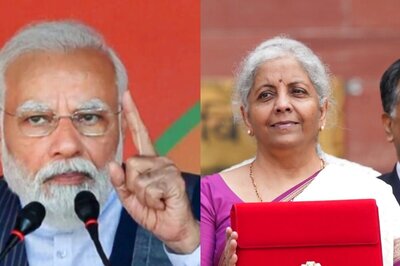
views
New Delhi: The embattled government faces the daunting task of appeasing voters weary of high inflation while trying to tame its fiscal deficit when it presents its budget for the next fiscal year on Monday.
Prime Minister Manmohan Singh's government is under pressure over high prices and its handling of a string of corruption scandals as his Congress party faces elections in five states this year, making it unlikely that it will unveil any sensitive reforms in the budget for the fiscal year starting in April.
Instead, Finance Minister Pranab Mukherjee is expected to count on a robust economy to expand revenue in the absence of big one-time gains that it enjoyed in the current year from the sale of 3G telecom licences.
Mukherjee is also expected to withdraw more of the stimulus that helped India weather the global economic downturn when he presents the budget to parliament at 11 am (0530 GMT) on Monday.
Asia's third-largest economy is on track to grow at 8.6 per cent in the current fiscal year that ends in March. A new government survey has forecast economic growth of 9 per cent for the next fiscal year.
"I expect the government can roll back stimulus (measures) in the budget by re-imposing taxes on most of the products that were given relief earlier, though the budget will be guided by the coming state elections," said Basanta Pradhan, an economist at the Institute of Economic Growth, a Delhi-based think-tank.
Reform measures, such as liberalising foreign investment in multi-brand retail and setting out a definitive roadmap for a nationwide goods and services tax, may need to wait for a more receptive political climate.
Mukherjee is expected to give priority to expanding investment in the farm sector, where inefficiency has helped drive food inflation to double-digits for much of the past year, fueling broader inflation that stands above 8 per cent despite seven interest rate increases since March last year.
Moves to bolster development of India's infrastructure are also expected. Inadequate power, roads and other infrastructure act as bottlenecks to growth and push up costs.
On Friday, a government survey forecast a fiscal deficit for the current fiscal year of 4.8 per cent of GDP - far better than the 5.5 per cent target, thanks to $23 billion in telecom licence revenue and a surge in growth that boosted tax receipts and enabled higher-than-budgeted spending.
The survey forecast a fiscal deficit of 4.8 per cent for the next fiscal year. Some economists say the figure is optimistic given the absence of one-time gains from the telecom licence sales and the prospect that India's subsidy burden could swell if oil prices stay above $100 per barrel and New Delhi continues to subsidise diesel and cooking fuels.
Some economists also expect a slowdown in growth in the new year, which would make the deficit target harder to reach.
New Delhi is likely to announce plans to borrow about Rs 4.5 trillion ($99.3 billion) from the bond market in the new fiscal year, roughly in line with the current year's borrowing, a Reuters poll found.
India is in a bind over inflation, which has prompted street protests and drawn criticism from the opposition. Food and fuel subsidies are popular with voters and help offset inflation but add to India's fiscal burden.
Deutsche Bank forecast subsidies in the current fiscal year would reach 2.5 per cent of GDP, above New Delhi's target of 1.8 per cent. It expects the subsidy burden in the next fiscal year ending in March 2012 to rise to 3 per cent of GDP.
"While India's bouyant economic growth will likely help support a robust increase in tax revenues, additional fiscal effort will be needed to keep the deficit from widening," Deutsche Bank economists wrote in a note.


















Comments
0 comment